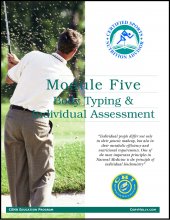You are here
Home ›Module Five: Body Typing and Individual Assessment

That we are individuals each with a unique disposition and appearance may come as no surprise, but in this module, the concept of biochemical individuality is explored to a degree that surpasses common knowledge. Individual people differ not only in their genetic makeup, but also in their metabolic efficiency and nutritional requirements. More and more nutrition scientists are warning us about the implications of choosing the wrong food base.
What is one man's food is another man's poison.
Module Five takes the reader through an amazing and highly informative examination of eleven classic bodytype models, each of which sorts the individual according to genetics, body shape, metabolic function, food cravings, personality traits, exercise tolerance, mood, emotion and predisposition to risk of disease and disability.
From the blood type paradigm popularized by Dr. Peter D'Adamo, we move on to somatotyping, originally introduced by Dr. William Sheldon. The ancient concept of Ayurvedic constitution is detailed, as well as Dr. Abravanel's theory of glandular dominance and Walcott's theory of Metabolic Type. The missing link of nutrition is identified in principles that review genetic and ethnic origin, and a modern approach to bodytype classification is revealed through the science that probes autonomic nervous system dominance and chronotyping.
The nature of both our attraction and aversion to sport is considered. Ever wonder why you love certain sports but can't stand others? Sport reveals true character. Functional type examines how the body adapts physiologically to various forms of physical activity out of necessity over time, and finally, we look back at the past and investigate the twenty chemical types proposed by Norwegian homeopath Dr. Rocine.
The modern discovery science of nutrigenomics is explained with special emphasis on human variation as it is revealed in our individual genome as SNPs (single nucleotide polymorphisms). The effects of the environment including air, food, water and even our emotions are considered with respect to epigenetics and nutrigenetics. The exciting message is that we can control the outcome of our health and performance long term.
Why spend time on bodytyping? Because the best way to help ourselves achieve optimum health and excellent performance, as well as offset the pain and suffering associated with chronic disease and age, is to first determine our individual uniqueness and biological diversity.

Module Five Table of Contents
Module Five Course Excerpt